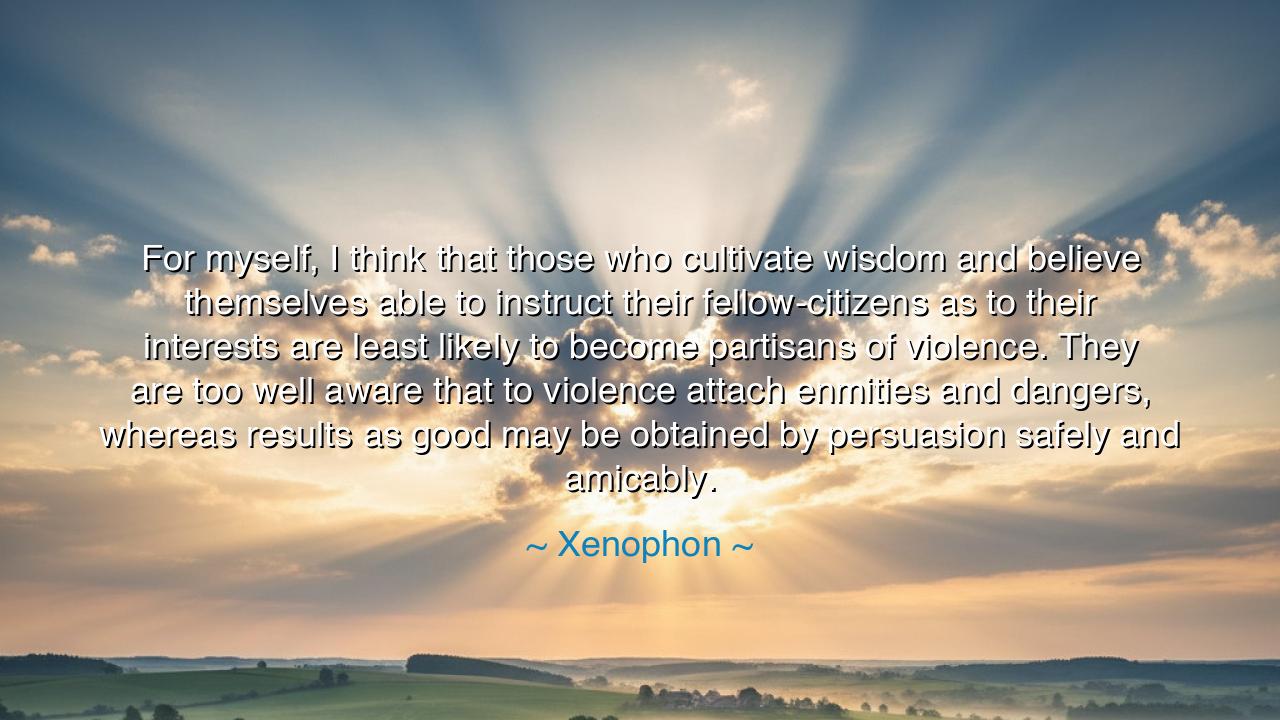
For myself, I think that those who cultivate wisdom and believe
For myself, I think that those who cultivate wisdom and believe themselves able to instruct their fellow-citizens as to their interests are least likely to become partisans of violence. They are too well aware that to violence attach enmities and dangers, whereas results as good may be obtained by persuasion safely and amicably.






The Athenian sage Xenophon, student of Socrates and soldier of fortune, bequeathed to us this noble reflection: “For myself, I think that those who cultivate wisdom and believe themselves able to instruct their fellow-citizens as to their interests are least likely to become partisans of violence. They are too well aware that to violence attach enmities and dangers, whereas results as good may be obtained by persuasion safely and amicably.” In these words, he unveils the shield of the wise—the shield not of iron, but of wisdom, which wards off the temptations of violence and turns instead to the power of persuasion.
The origin of this teaching lies in the tumult of Greek life, where city-states often clashed, and men were quick to settle disputes with sword or spear. Yet Xenophon, who himself marched through the perils of Persia and commanded armies, understood the terrible price of violence. Blood spilled breeds only further hatred, and victory won by force leaves behind a trail of enemies who bide their time for revenge. But persuasion, born of reason and respect, heals divisions, secures alliances, and achieves ends without enmity.
History gives us the shining example of Nelson Mandela, who, after long years in prison, emerged not with a call to vengeance, but with a voice of reconciliation. He could have unleashed his people in wrath against their oppressors; instead, he chose the path of persuasion, urging forgiveness and unity. By this he transformed a nation and avoided the rivers of blood that so easily could have flowed. Like Xenophon’s wise citizen, Mandela knew that the sword divides, but the word unites.
The ancients often contrasted the tongue and the spear. The spear may conquer for a moment, but the tongue—when guided by wisdom—conquers hearts for generations. A ruler who governs by fear may sit upon the throne, but he trembles in the night, for he knows that enemies surround him. A leader who wins by persuasion, however, builds a foundation of loyalty that no blade can cut through.
Therefore, children of tomorrow, remember: do not be swift to draw the weapon of violence, for it binds you to danger and breeds endless foes. Instead, cultivate wisdom, so that your voice may carry the strength of reason, the warmth of justice, and the light of peace. For in the end, it is not the clenched fist but the open hand, not the iron blade but the silver word, that brings lasting victory to the soul and to the city.






AVAn Vu
This quote seems to contrast wisdom with violence, highlighting the value of peaceful persuasion. However, it also raises the question: can those who wield wisdom ever truly influence the masses in a meaningful way without using power or force? In today’s world, where attention is often grabbed by the most extreme and loudest voices, can gentle persuasion stand a chance? What role does power play in making wisdom effective, and how can we make sure it doesn’t lose its impact?
TVThuy Vu
Xenophon’s argument is compelling, but I find myself questioning how we define ‘violence’ in modern terms. Is it only physical violence, or can verbal aggression, manipulation, and coercion count as violence too? In that case, how much of our communication, especially in politics, is violent in nature? Are we seeing a rise in violent rhetoric disguised as persuasion? It’s something to think about when we discuss how wisdom relates to our methods of influence.
Hhongminh
I think there’s a lot of wisdom in this quote, but it also makes me wonder if the definition of ‘wisdom’ might differ from person to person. Some might argue that extreme situations require extreme measures, even violence, for change to happen. How can we distinguish between situations where peaceful persuasion is enough and where more forceful action might be needed? Is there a threshold where persuasion fails and violence becomes inevitable?
STSuriki TV
This idea of using persuasion instead of violence sounds ideal, but is it realistic in all situations? In our current political climate, I wonder if people who have the wisdom to avoid violence are truly heard, or if the loudest voices, often those of aggression, dominate the conversation. Can persuasion really achieve lasting change, or is it just a tool used by the powerful to maintain the status quo? It seems like a fine balance to strike.
TVThu Vu
I really agree with this perspective that wisdom leads away from violence. However, I’m curious: is there a line where persuasion alone just isn't enough, and action must follow? Can wisdom sometimes be a hindrance to necessary change when it’s about confronting injustice or oppression? It seems like persuasion only works if the other party is open to it, and sometimes it feels like we’re up against a wall that can’t be moved with words.